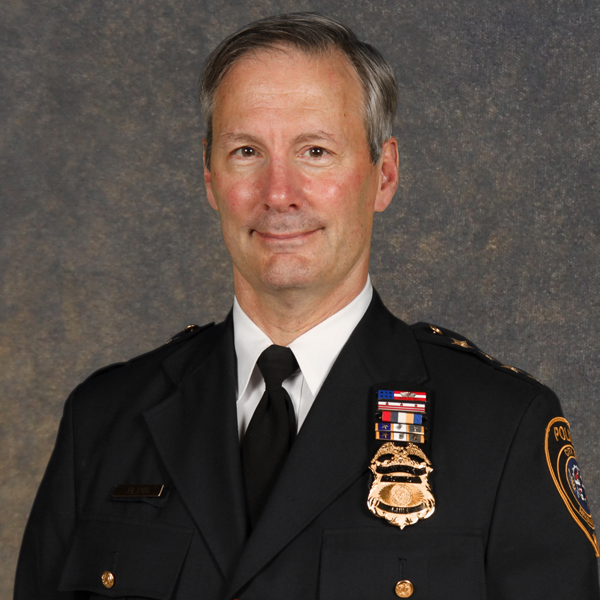Police Chief Flynn Resigns
Nationally known chief who changed Milwaukee department retires at age 69.
Milwaukee Police Chief Edward Flynn made a surprise announcement of his retirement today, after serving 10 years as chief and instituting many reforms in the department. He began his impromptu press conference by noting that the day before was the 10th anniversary of his swearing in as chief, and roughly eight minutes after he started speaking he announced he would be leaving.
“In 10 years, a lot has happened. Much has been accomplished, much has been achieved. It’s a good benchmark. And it’s time, time to say thank you, time to say goodbye.”
Flynn was the fifth longest-serving chief in the MPD’s 162-year history and the first, since the law was changed to institute a four-year term of office, to be reappointed, not once but twice. He will retire on February 16, nearly two years in advance of the end of his third term, scheduled to expire Jan. 7, 2020.
Flynn modernized the department in many ways, greatly improving its computer systems and emphasizing a pro-active, data-oriented approach to fighting crime, and the result was a steady decrease in crime in Milwaukee over his first six years. He also emphasized more beat cops, fewer detectives and neighborhood-savvy, community-oriented policing. In the last couple years, however, there has been an increase in some crimes, and increasing criticism of his department, with calls for reforms, particularly after a draft report of an unfinished federal Department of the Justice review of the MPD’s policies and practices was released. Milwaukee Common Council members pushed for Flynn to change to a more aggressive policy on police pursuits, and the Fire and Police Commission (FPC) ordered Flynn to do so or face discipline. In response he changed the policy.
Flynn, 69, was first appointed in 2008 and made his announcement just days before he was scheduled to go before the FPC for a performance evaluation. In the last year or so, Flynn has seemed increasingly frustrated by criticism of him and his department, while Milwaukee Common Council members criticized him for a failure to communicate with city officials.
The FPC will select an acting chief “from within the department,” it said in a news release.
Flynn came to Milwaukee with a reputation as one of the most innovative police chiefs in the nation and during his time here was asked to testify at the Senate Judiciary Committee hearing on the “Assault Weapons Ban of 2013” and to speak at the President’s Task Force on 21st Century Policing i2015.
“Becoming Chief in Milwaukee was the fulfillment of a career dream,” Flynn noted in his statement. “I promised the residents of this city when I was first sworn in that, ‘I will not let you down.’ I have done my professional best to fulfill that promise.”
From the beginning of his tenure here Flynn announced he would be a very different kind of police chief. “Our measure of success will not be the number arrests” or “the number of traffic citations” or “response time to non-emergency calls,” he declared upon taking office. “Our measures of success will be the reduction of crime, fear and disorder in Milwaukee.”
Flynn convinced the Greater Milwaukee Committee to help fund technological improvements in the department, hired the department’s first crime analyst and added more such staff over the years, created a Neighborhood Task Force to target hots spots susceptible to violent crime, redrew the lines of police districts with a goal of following historic neighborhood lines and crime patterns more closely, changed the police response to put more emphasis on serious crimes, instituted Roll Call in the Streets to provide a visible police presence and to emphasize the connection of officers to the community, instituted the Shot Spotter technology to more quickly respond to gun violence, and created a Merit Awards program to recognize exemplary service by officers. Under his leadership the department won numerous federal grants to make changes and improvements in the department.
“I was brought here to be a change agent and a change agent I have been,” Flynn noted. “Citizen complaints and uses of force are at all time lows. By any objective standard it is a model agency. What I leave behind isn’t necessarily programs or policies, for strategies and tactics. What I leave behind are high quality people who have demonstrated… a commitment to the city.” He noted that he hired one third of those now working in the department.
Under Flynn’s leaderhip crime steadily declined in Milwaukee through 2013, only to begin rising in the next two years. “We had two very tough years for homicide in 2015 and 2016,” he said. But other crimes declined in 2016 and 2017. Overall, the level of crime is still far below the level he inherited. The recent drop in crime, especially in homicide, encouraged him as he pondered his retirement, Flynn said: “I wasn’t gonna be leaving in the middle of a crimewave.”
Flynn expressed gratitude to Mayor Tom Barrett for his consistent support and Barrett praised the job Flynn did, noting that “10 years is an eternity as a police chief in a major American city… You have earned this recognition, you have earned the right to retire.”
But ultimately, all the changes instituted by Flynn also won him critics, as he acknowledged. “In the world of policing it is far safer to fail conventionally, than it is to innovate.”
But Flynn said his decision to retire is not related to the friction he has been receiving lately from the Common Council. “Quite honestly there were times I thought over the last year or so, ‘Gosh I could save them so much heartache if they only knew that all their troubles will soon be over.’”
“I don’t know what they’re going to talk about now.”
If you think stories like this are important, become a member of Urban Milwaukee and help support real independent journalism. Plus you get some cool added benefits, all detailed here.
More about the Retirement of Chief Flynn
- Ed Flynn Looks Back — And Ahead - Dave Fidlin - Feb 9th, 2018
- Police Chief Flynn Resigns - Bruce Murphy and Graham Kilmer - Jan 8th, 2018
- Flynn Departure Creates New Opportunities - State Sen. Lena Taylor - Jan 8th, 2018
- Common Council Statement on Flynn Retirement - Milwaukee Common Council - Jan 8th, 2018
- Fire & Police Commission Response to Chief Flynn Retirement Announcement - City of Milwaukee Fire and Police Commission - Jan 8th, 2018
Read more about Retirement of Chief Flynn here





















Happy retirement, Chief Flynn.
(Don’t mind me. I’m just here to follow the derptastic commentary from the wingnut brigade, all hopped up on whatever Belling planted in their lil’ heads.)
Bob Donovan for Police Chief!
An big improvement after Artie Jones. Still, too cozy a bedfellow with Barrett. Hopefully, Harpole will get another chance. I’ve always liked him.
PMD: Donovan totally lacks the knowledge and temperament to be a police chief of a large urban department. He’d go to pieces.
In my opinion, Ed Flynn was the best chief of police we have had in this city in the more than 30 years I have lived here. He was the most articulate and most present of those chiefs. His roll calls in neighborhoods after incidents in those neighborhoods were effective. His pre-incident presence was impressive as well. I remember being surprised by seeing him leading a contingent of police on a walk on E. North Ave. at the beginning of a Harley Anniversary block party: effectively telling those of us who were ready to party to take care because the cops were there. I appreciated his presence at that event because I understood that things can get out of hand in hard party atmospheres. It is good to have cops in those places at those times.
Chief Flynn always made sense at press conferences. By contrast, former Sheriff Clarke rarely achieved coherence.
Thanks, Chief Flynn, and enjoy retirement. You have earned some rest and relaxation.
I’ve compiled a list of recent crimes in my neighborhood in the last 6 months, the status of over 80% being ‘Filed or Otherwise’. Their status remains unclear though I guess ultimately will be bundled into happy talk ‘reports’. You how – how ‘burglalries’ are down because, well, now they are reported as ‘criminal damage to property’. So much for ‘data driven’. Don’t equate his rhetoric with effectiveness, much less ‘transparency’. Life is good in the 3rd and 5th Ward (with lots of cops on patrol there! Arugala down – send back up!) The rest of the City is getting fed up. So are the cops themselves for that matter.
Hey U.M. – why don’t you move your offices to 53206. Or 27th and Burleigh. So you can be more truly ‘urban’ and practice that advocacy journalism you do well
not only Orly says: You are so right! When I worked in District 7, garage burglaries were off the charts. I was ordered to file them as thefts or criminal damage to property. Take note that a burglary is a felony and the latter two are misdemeanors. Cooking the numbers to look good.
Re posts 5 & 6, yes, we know that a lot of crime takes place in zip code 53206. I visit a friend who lives there several times a month. I am sometimes alarmed at the # of squad cars pulling people over on my drive back home. Questions concerning profiling come to mind. Then again, I remember living in cities where police ignored or avoided policing in high crime areas. I would rather have police respond in areas where crime is prevalent than have police ignore it. Chief Flynn devoted high #s of police to high crime areas of the city. He was often criticized for that, but I think that strategy made sense. If you want to rid a city of bad guys, you have to find the bad guys where they are.